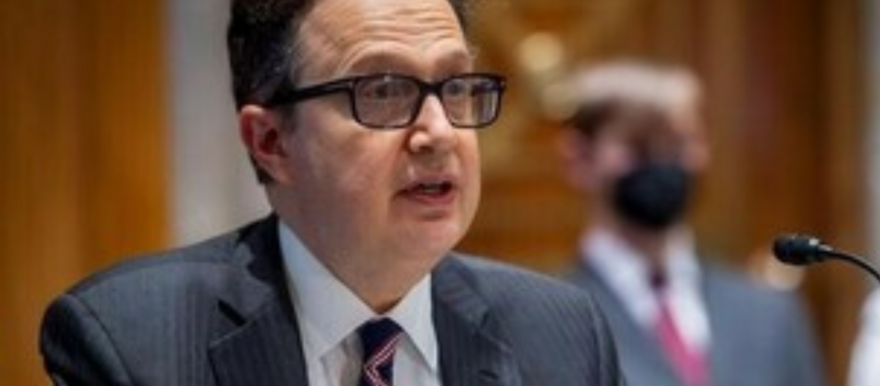The US Embassy marked the 35th World AIDS Day at the American Corner, Juba University, with United States Ambassador to South Sudan, Michael J. Adler, expressing gratitude: “Many thanks for joining my U.S. Embassy colleagues and me at the American Corner to recognize the 35th World AIDS Day and to discuss U.S. Government assistance to the people of South Sudan to help save lives that would otherwise be lost to HIV.”
During the event held on Friday, December 1, Ambassador Adler shared insights into this year’s theme, “World AIDS Day 35: Remember and Commit,” which honours the more than 40 million lives lost to HIV/AIDS globally. He emphasized the occasion as an opportunity to reaffirm the commitment to the global mission of eradicating HIV/AIDS by 2030.
Ambassador Adler underscored the profound impact of the AIDS pandemic on millions of people, families, and entire communities worldwide. In the context of South Sudan, he pointed out the challenges, stating, “Only 200 health facilities across the country have the staff and resources needed to provide comprehensive care for the estimated 160,000 people living with HIV.”
“Twenty years ago, U.S. President George W. Bush announced the creation of the U.S. President’s Emergency Plan for AIDS Relief, also known as PEPFAR. Since that historic announcement, the people of the United States have provided more than $100 billion to save more than 25 million lives. These efforts continue to strengthen the critical health infrastructure needed to effectively respond to health crises such as COVID-19 and Ebola,” he said.
Ambassador Adler shed light on the collaborative efforts between the U.S. Embassy and partners in South Sudan, emphasizing their mission to fortify the nation’s fragile health system. He stated, “In South Sudan, the U.S. Embassy and our partners work together to help strengthen the country’s fragile health system by providing resources and technical assistance to prevent new infections and help ensure people follow their treatments.”
Highlighting the enduring support of the United States for South Sudan, Ambassador Adler mentioned, “U.S. support for the people of South Sudan began decades before the independence of this country. PEPFAR is but one element of this, but it is the one we are talking about today.”
Before delving into the specifics of PEPFAR, Ambassador Adler outlined the foundational values guiding the decades-long engagement in South Sudan, emphasizing beliefs in human rights, democracy, and the people’s right to a government that addresses public needs. He called upon the transitional government to increase funding for the health sector, urging a shift from a historically donor-led effort to a more self-sustained approach.
Returning to PEPFAR, Ambassador Adler shared significant figures, stating, “Since 2007, the United States has provided $367 million for HIV relief in South Sudan. This year, PEPFAR’s budget in South Sudan is $42 million.” He revealed that 87 percent of the more than 61,000 South Sudanese individuals currently on HIV treatment receive support from PEPFAR. In 2023, PEPFAR enrolled 12,600 new clients on treatment.
Acknowledging the profound impact of the HIV epidemic globally, Ambassador Adler concluded, “The impact of this epidemic has been profound, affecting individuals, families, and entire communities across the globe. Remembering the lives lost not only honours their memory but also emphasizes the urgency of our commitment to end the HIV epidemic.”
The U.S. diplomat emphasized the significance of remembrance, stating, “Through remembrance, we draw strength and determination to redouble our efforts in fighting the disease and providing support to those with HIV. It’s time to remind ourselves of the importance of compassion, empathy, and solidarity in the face of adversity.”
Ambassador Adler detailed the impact of PEPFAR in South Sudan, highlighting its role in enabling HIV-carrying mothers to give birth to over 2,100 babies who were born HIV-free. Additionally, PEPFAR has provided critical care and support for 3,700 orphans, vulnerable children, and their caregivers, alleviating the physical, emotional, and economic impacts of HIV.
Acknowledging the ongoing challenges, Ambassador Adler emphasized, “There is still so much more we need to do to effectively prevent and respond to HIV and AIDS. As I noted, this includes increased Transitional Government use of public revenue to address public health needs.”
In conclusion, he expressed gratitude to the representatives of implementing partners, stating, “I will conclude by thanking the representatives of our implementing partners who are here with us today. I know I speak for all of my U.S. Embassy colleagues involved in PEPFAR when I express my appreciation for your dedication, courage, and commitment. It is an honour to be working together with you to help save lives in South Sudan.”




